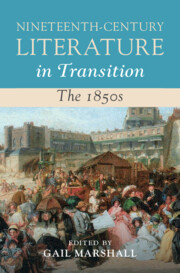Book contents
- Nineteenth-Century Literature in Transition: The 1850s
- Nineteenth-Century Literature in Transition
- Nineteenth-Century Literature in Transition: The 1850s
- Copyright page
- Contents
- Figures
- Contributors
- Acknowledgements
- Introduction
- Chapter 1 Pictures of Nature
- Chapter 2 ‘When I Came Back, It Was … to the Love of a New Generation’
- Chapter 3 George Eliot, the Westminster Circle, and Karl Ernst von Baer’s Embryological Germ Theory
- Chapter 4 The 1850s Sustainability Novel
- Chapter 5 Serialising London in ‘Twice Round the Clock’
- Chapter 6 Theatre in the 1850s
- Chapter 7 Beyond the Art of Conversation
- Chapter 8 Making Soldiers Count
- Chapter 9 Finding the Lost
- Chapter 10 British India in the 1850s
- Chapter 11 Christian Heroism
- Chapter 12 Horsepower in the Railway Age
- Chapter 13 Trauma, Gender, and Resistance
- Chapter 14 The Poetry of Married Life
- Chapter 15 George Eliot, Henry James, Realism, and Europe
- Index
Chapter 4 - The 1850s Sustainability Novel
Manufacturers, Serials, and (Eco)systems in Dickens and Gaskell
Published online by Cambridge University Press: 02 January 2025
- Nineteenth-Century Literature in Transition: The 1850s
- Nineteenth-Century Literature in Transition
- Nineteenth-Century Literature in Transition: The 1850s
- Copyright page
- Contents
- Figures
- Contributors
- Acknowledgements
- Introduction
- Chapter 1 Pictures of Nature
- Chapter 2 ‘When I Came Back, It Was … to the Love of a New Generation’
- Chapter 3 George Eliot, the Westminster Circle, and Karl Ernst von Baer’s Embryological Germ Theory
- Chapter 4 The 1850s Sustainability Novel
- Chapter 5 Serialising London in ‘Twice Round the Clock’
- Chapter 6 Theatre in the 1850s
- Chapter 7 Beyond the Art of Conversation
- Chapter 8 Making Soldiers Count
- Chapter 9 Finding the Lost
- Chapter 10 British India in the 1850s
- Chapter 11 Christian Heroism
- Chapter 12 Horsepower in the Railway Age
- Chapter 13 Trauma, Gender, and Resistance
- Chapter 14 The Poetry of Married Life
- Chapter 15 George Eliot, Henry James, Realism, and Europe
- Index
Summary
Shannon and Marshall read London alongside the city of Manchester, and the fictional town of Cranford in their chapter, which takes some of the decade’s industrial novels and examines them through the lens of sustainability. The chapter is mindful that it is in this period that industrialisation and globalisation begin to achieve the capacity that we are now seeking to control as we realise the environmental devastation of their proliferation; and that industrial success is based on a deeply unsustainable exploitation of human and natural resources. The authors argue that though Dickens and Gaskell did not have the language of sustainability that is available to us, nonetheless their work begins to recognise the costs of British trade domination. The picture is complicated by the novelists’ own dependence on the industrialisation of publishing, its increasingly necessary global reach, and the tight deadlines of the serialised novel, on which periodical publications depended.
Keywords
- Type
- Chapter
- Information
- Nineteenth-Century Literature in Transition: The 1850s , pp. 90 - 112Publisher: Cambridge University PressPrint publication year: 2025

